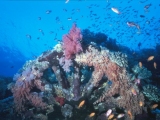Thursday, May 21, 2009
Manage corals and minimise climate change
 A better assessment of the threats to coral reefs along with improved management will give corals a much higher chance of survival in the face of warming oceans, says IUCN's latest report.
A better assessment of the threats to coral reefs along with improved management will give corals a much higher chance of survival in the face of warming oceans, says IUCN's latest report.“We already know that climate change is destroying coral reefs through warming waters that cause coral bleaching and through acidifying oceans that hinders coral skeleton growth. We also know that if we want to save these beautiful living entities we must do something about it immediately,” says Gabriel Grimsditch, IUCN Corals Expert.
The report, Resilience Assessment of Coral Reefs - Rapid assessment protocol for coral reefs, focusing on coral bleaching and thermal stress, shows that the amount of damage done to corals depends not only on the rate and extent of climate change, but also on the ability of coral reefs to cope with change. This report outlines a protocol that defines basic resilience indicators that can be quantified using rapid assessment methods.
The need for quick results for measuring coral reef resilience is becoming increasingly acute, especially in the developing world. It is crucial to develop monitoring and assessment protocols to build an understanding of bleaching resistance and resilience indicators for application in management, and to determine how Marine Protected Area management actions can influence resilience and resistance.
"Research assessment for coral reefs builds our understanding of past management actions in maintaining the resilience of coral reefs, and helps managers combat the effects of climate change,” says Carl Gustaf Lundin, Head of IUCN’s Global Marine Programme. “Greater investment must be made in using research findings for adaptive management.”
“The story of coral reefs is particularly powerful and compelling, being one of the first ecosystems to clearly show climate change impacts, and being well-understood, highly visible and charismatic,” adds Lundin. “As a result, increasing our knowledge base of resilience-based science, management and policy for coral reefs has broader value for other ecological and human systems globally.”
“Findings from coral reefs should be more efficiently incorporated into the United Nations’ climate change negotiations in Copenhagen in December.”
IUCN, the International Union for Conservation of Nature, is the world’s oldest and largest global environmental network - a democratic membership union with more than 1,000 government and non-government member organisations, and almost 11,000 volunteer scientists in more than 160 countries.
Read the report: Resilience Assessment of Coral Reefs - Rapid assessment protocol for coral reefs
What do you think of this news item? Join a discussion.
Labels: coral, coral reef, SCUBA News